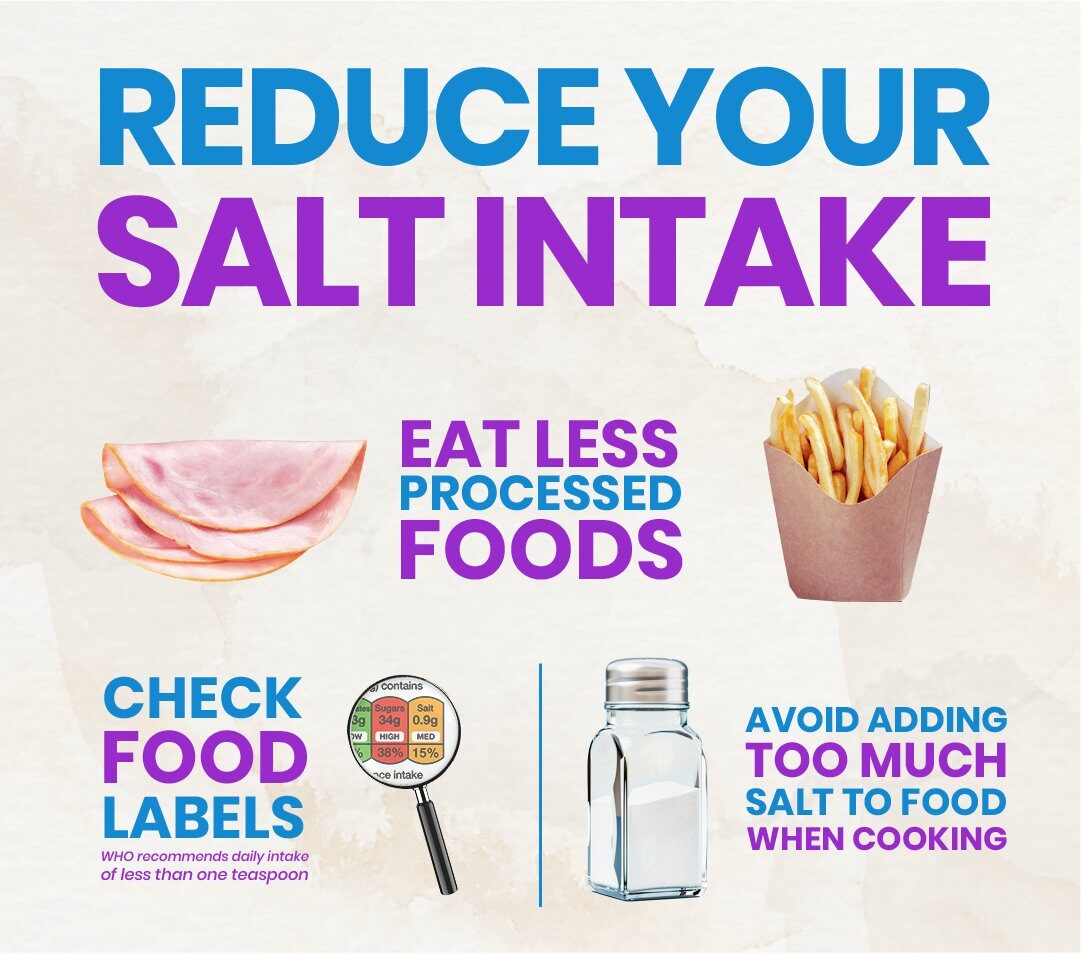Salty Diet and High Blood Pressure – High blood pressure, also known as hypertension, is a condition where the force of blood against the walls of the arteries is consistently elevated. Normal blood pressure is considered to be below 120/80 mmHg. However, if the blood pressure consistently reads above 130/80 mmHg, it is considered high.
Reducing salt intake improves blood pressure and mental well-being in people with primary aldosteronism.
READ ALSO
See How Traffic noise can increase your High Blood Pressure and the ways to avoid it
That’s according to results from a studyTrusted Source published today in the Journal of Internal Medicine.
Researchers analyzed the overall effect of moderate salt restriction over the course of 12 weeks on 41 people being treated for primary aldosteronism.
Primary aldosteronismTrusted Source happens when the adrenal glands make an excess of the hormone aldosterone.
It is a cause of hypertension and a risk factor for heart disease.
Salty Diet and High Blood Pressure – What researchers found in the dietary salt study
In their study, researchers said that moderate salt restriction was associated with reduced blood pressure and reduced depressive symptoms and anxiety symptoms.
They said no observable negative reactions or adverse effects were observed.
The study authors suggest these health improvements are comparable to a full dose of additional antihypertensive medication.
Dr. Christian Adolf, a physician and researcher at Ludwig Maximilian University of Munich in Germany and a corresponding study author, said in a press release that the study shows that a moderate dietary salt restriction is doable for people, especially when combined with a dedicated smartphone app for continuous motivation.
He added that this type of diet has a strong antihypertensive effect in people with primary aldosteronism.
What nutrition experts have to say
“The research is consistent with other studies showing that salt reduction may help reduce hypertension risk,” said Kristin Kirkpatrick, MS, RDN, a nutritionist and the author of “Skinny Liver.”
“Further, other studies have shown even small salt reductions may assist in benefits to overall cardiovascular health,” she told Healthline.
Sally K. Norton, BSN, MPH, author of “Toxic Superfoods: How Oxalate Overload is Making You Sick and How to Get Better,” added that as a nutritionist with a background in public health research, she approaches every study with a critical eye.
“I think it is important to note that this salt trial is for patients with a genetic condition of aldosteronism and does not apply to the general population,” Norton told Healthline. “The effect of the reduction in dietary sodium intake on blood pressure levels depends on the population studied.”
“Salt-dependent hypertension in aldosterone excess is a very particular situation and not generalizable to other groups of patients. In general, people without genetic issues can manage hypertension by increasing potassium intake, as potassium is commonly lacking in modern foods,” she explained.
Salty Diet and High Blood Pressure – How to reduce salt in your diet
There are many reasons why someone may consider reducing their salt intake.
Having primary aldosteronism is just one of those reasons.
Here’s some advice from experts on ways to reduce your daily salt consumption.
Start by taking stock of your salt intake
If you are looking to make a change in your diet regarding salt intake, Kirkpatrick says it’s a good idea to start with an overall assessment of your diet and how much salt you may be consuming.
For starters, Kirkpatrick says to turn the label around on food packaging and assess how many milligrams per serving each product has.
“Assessments of salt intake in the U.S. indicate that most excess salt comes from processed and ultra-processed foods and that simply reducing the intake of these foods may help significantly reduce overall sodium intake,” she said.
Know some “secret sources” of salt in everyday diet
“In addition, knowing some secret and not-so-secret sources of salt may also help in a reduction,” Kirkpatrick said.
“For example, most of my patients think that many soups may be high in sodium and will seek out lower-sodium options. In contrast, fewer of my patients realize that certain brands of bread, canned beans, condiments, and cheeses may also have excess sodium,” she added.
Use herbs to your advantage
Herbs can also help.
Kirkpatrick says she guides her patients on how to incorporate more herbs as seasoning in their diets.
“Having herbs in place of salt not only offers a sodium reduction but also adds in disease-fighting compounds as well,” she says.
You can also control salt levels by cooking from scratch.
“If you enjoy salt on certain foods (think mixed nuts, for example) take control from the manufacturer and put control back in your diet, for example, purchasing unsalted nuts and controlling a small amount of salt you add yourself,” says Kirkpatrick.
Norton suggests cooking from scratch as much as possible and using high-quality mineral salts without additives because they contain trace minerals.
Additionally, “anyone with high blood pressure may also need to address their stress levels and stay active,” Norton said.

